Legal and Professional Issues: Analysis of Ms. A's Healthcare Case
VerifiedAdded on 2022/09/05
|13
|3369
|31
Report
AI Summary
This report provides a comprehensive analysis of the legal and ethical considerations surrounding Ms. A's request to cease life-sustaining treatment. The case involves a 46-year-old woman with a spinal cord injury who wishes to withdraw nutrition and hydration, leading to a discussion of euthanasia, patient autonomy, and the roles of healthcare professionals. The report examines the legal frameworks in Australia and Singapore, differentiating between active and passive euthanasia, and analyzing the potential risks faced by nursing staff who comply with or refuse the patient's request. It explores the ethical dilemmas, including beneficence, non-maleficence, and the application of Kantian ethics. Furthermore, the report considers the implications of advance medical directives, mental capacity assessments, and the professional codes of conduct, offering insights into the complexities of end-of-life decisions in healthcare settings.
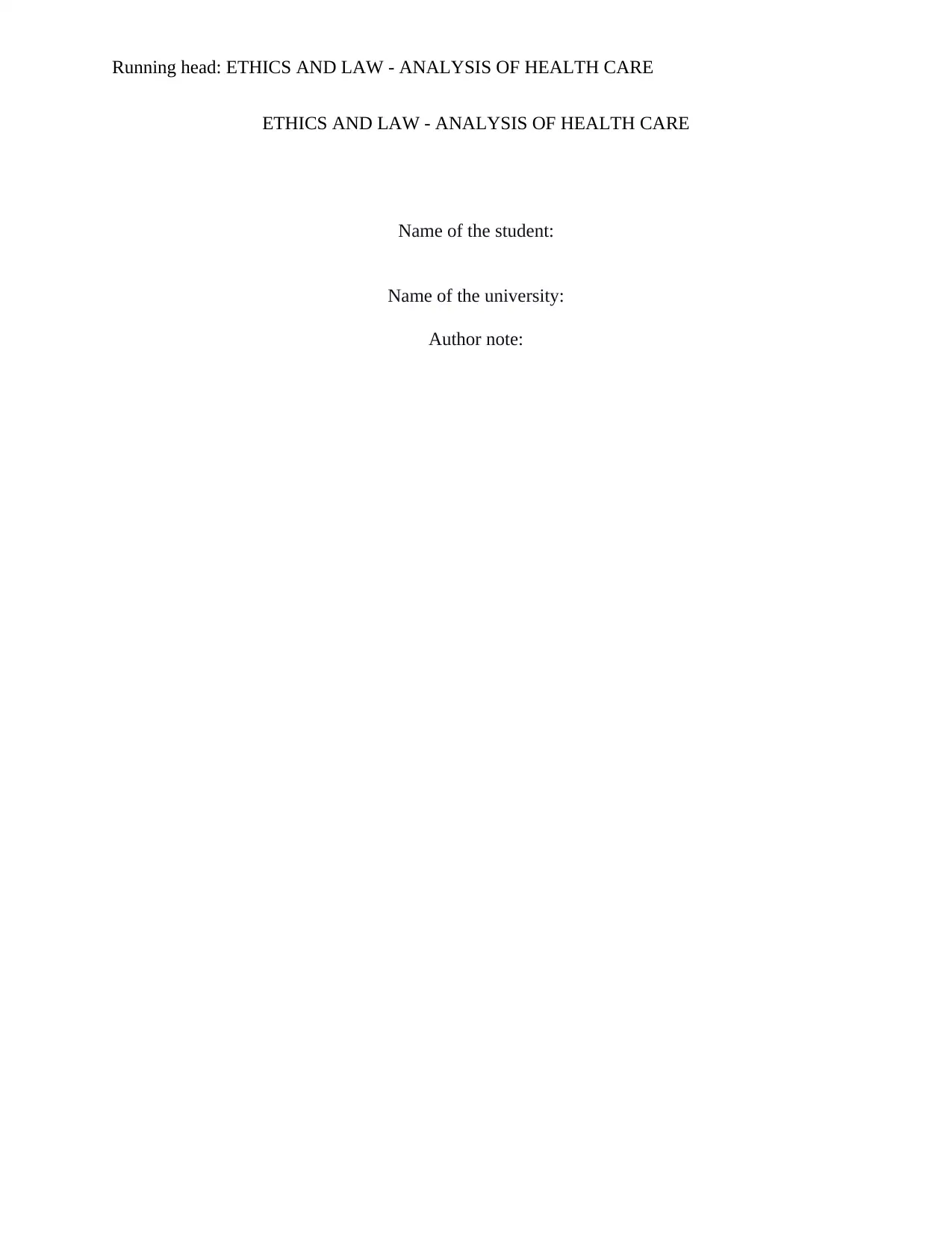
Running head: ETHICS AND LAW - ANALYSIS OF HEALTH CARE
ETHICS AND LAW - ANALYSIS OF HEALTH CARE
Name of the student:
Name of the university:
Author note:
ETHICS AND LAW - ANALYSIS OF HEALTH CARE
Name of the student:
Name of the university:
Author note:
Paraphrase This Document
Need a fresh take? Get an instant paraphrase of this document with our AI Paraphraser
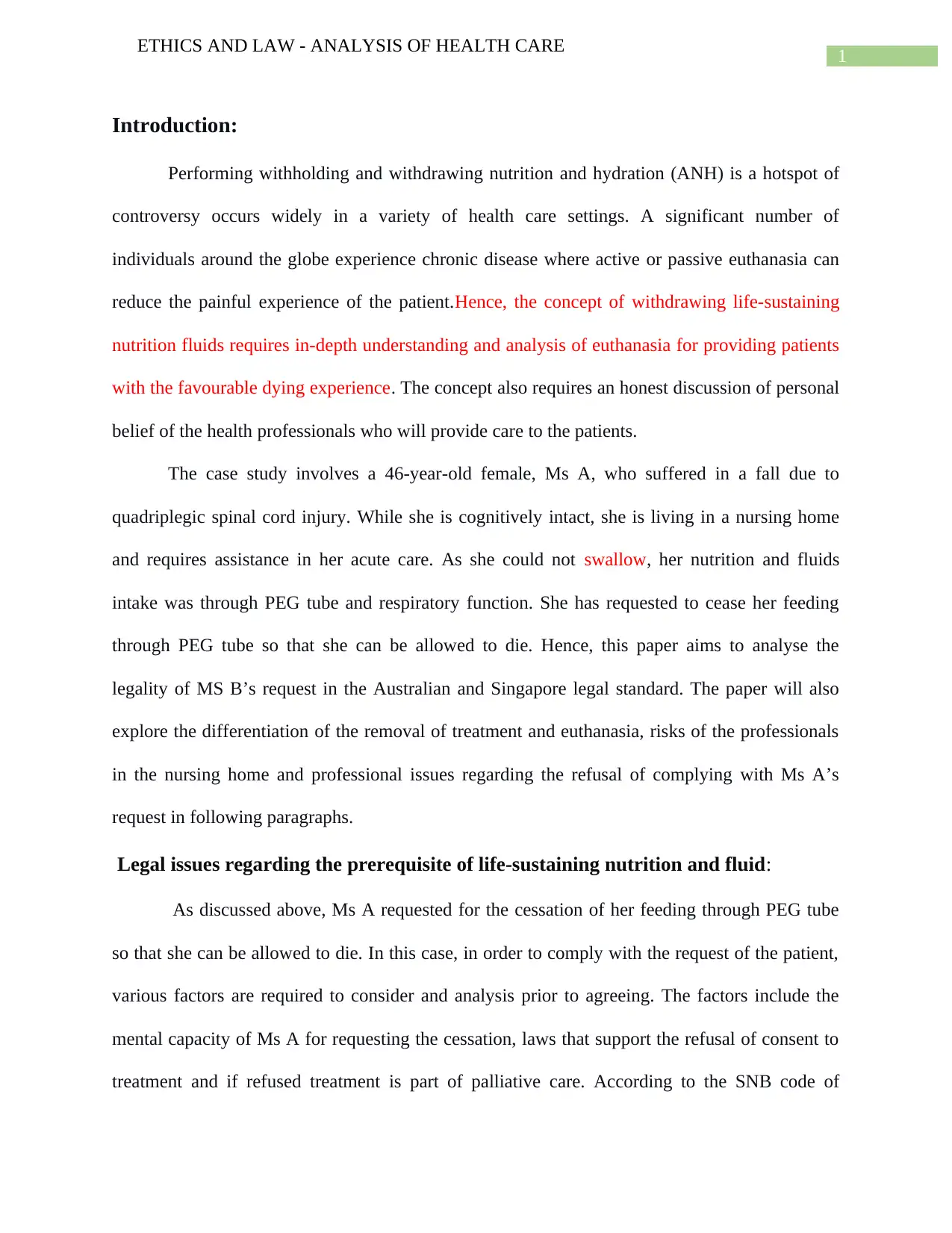
1
ETHICS AND LAW - ANALYSIS OF HEALTH CARE
Introduction:
Performing withholding and withdrawing nutrition and hydration (ANH) is a hotspot of
controversy occurs widely in a variety of health care settings. A significant number of
individuals around the globe experience chronic disease where active or passive euthanasia can
reduce the painful experience of the patient.Hence, the concept of withdrawing life-sustaining
nutrition fluids requires in-depth understanding and analysis of euthanasia for providing patients
with the favourable dying experience. The concept also requires an honest discussion of personal
belief of the health professionals who will provide care to the patients.
The case study involves a 46-year-old female, Ms A, who suffered in a fall due to
quadriplegic spinal cord injury. While she is cognitively intact, she is living in a nursing home
and requires assistance in her acute care. As she could not swallow, her nutrition and fluids
intake was through PEG tube and respiratory function. She has requested to cease her feeding
through PEG tube so that she can be allowed to die. Hence, this paper aims to analyse the
legality of MS B’s request in the Australian and Singapore legal standard. The paper will also
explore the differentiation of the removal of treatment and euthanasia, risks of the professionals
in the nursing home and professional issues regarding the refusal of complying with Ms A’s
request in following paragraphs.
Legal issues regarding the prerequisite of life-sustaining nutrition and fluid:
As discussed above, Ms A requested for the cessation of her feeding through PEG tube
so that she can be allowed to die. In this case, in order to comply with the request of the patient,
various factors are required to consider and analysis prior to agreeing. The factors include the
mental capacity of Ms A for requesting the cessation, laws that support the refusal of consent to
treatment and if refused treatment is part of palliative care. According to the SNB code of
ETHICS AND LAW - ANALYSIS OF HEALTH CARE
Introduction:
Performing withholding and withdrawing nutrition and hydration (ANH) is a hotspot of
controversy occurs widely in a variety of health care settings. A significant number of
individuals around the globe experience chronic disease where active or passive euthanasia can
reduce the painful experience of the patient.Hence, the concept of withdrawing life-sustaining
nutrition fluids requires in-depth understanding and analysis of euthanasia for providing patients
with the favourable dying experience. The concept also requires an honest discussion of personal
belief of the health professionals who will provide care to the patients.
The case study involves a 46-year-old female, Ms A, who suffered in a fall due to
quadriplegic spinal cord injury. While she is cognitively intact, she is living in a nursing home
and requires assistance in her acute care. As she could not swallow, her nutrition and fluids
intake was through PEG tube and respiratory function. She has requested to cease her feeding
through PEG tube so that she can be allowed to die. Hence, this paper aims to analyse the
legality of MS B’s request in the Australian and Singapore legal standard. The paper will also
explore the differentiation of the removal of treatment and euthanasia, risks of the professionals
in the nursing home and professional issues regarding the refusal of complying with Ms A’s
request in following paragraphs.
Legal issues regarding the prerequisite of life-sustaining nutrition and fluid:
As discussed above, Ms A requested for the cessation of her feeding through PEG tube
so that she can be allowed to die. In this case, in order to comply with the request of the patient,
various factors are required to consider and analysis prior to agreeing. The factors include the
mental capacity of Ms A for requesting the cessation, laws that support the refusal of consent to
treatment and if refused treatment is part of palliative care. According to the SNB code of
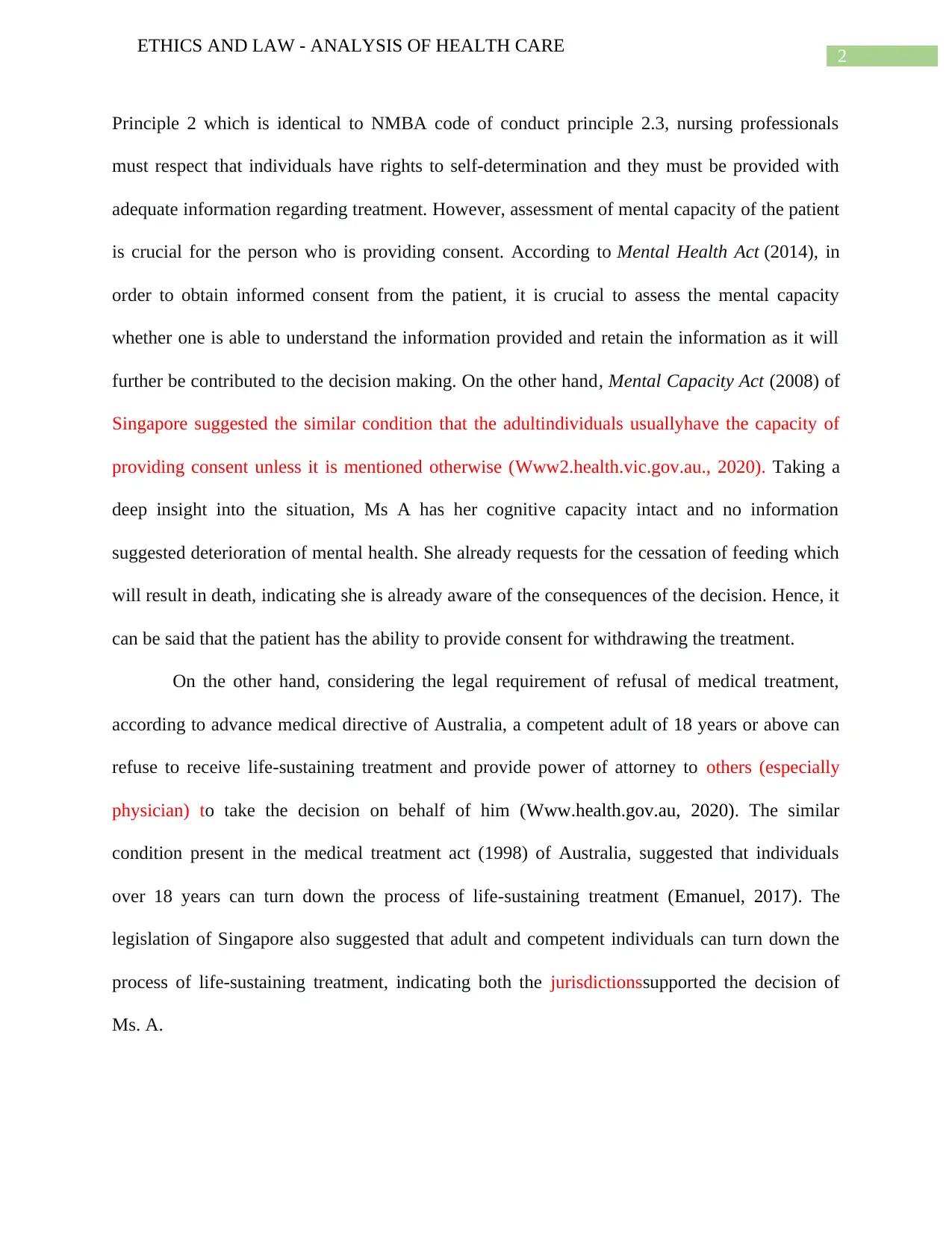
2
ETHICS AND LAW - ANALYSIS OF HEALTH CARE
Principle 2 which is identical to NMBA code of conduct principle 2.3, nursing professionals
must respect that individuals have rights to self-determination and they must be provided with
adequate information regarding treatment. However, assessment of mental capacity of the patient
is crucial for the person who is providing consent. According to Mental Health Act (2014), in
order to obtain informed consent from the patient, it is crucial to assess the mental capacity
whether one is able to understand the information provided and retain the information as it will
further be contributed to the decision making. On the other hand, Mental Capacity Act (2008) of
Singapore suggested the similar condition that the adultindividuals usuallyhave the capacity of
providing consent unless it is mentioned otherwise (Www2.health.vic.gov.au., 2020). Taking a
deep insight into the situation, Ms A has her cognitive capacity intact and no information
suggested deterioration of mental health. She already requests for the cessation of feeding which
will result in death, indicating she is already aware of the consequences of the decision. Hence, it
can be said that the patient has the ability to provide consent for withdrawing the treatment.
On the other hand, considering the legal requirement of refusal of medical treatment,
according to advance medical directive of Australia, a competent adult of 18 years or above can
refuse to receive life-sustaining treatment and provide power of attorney to others (especially
physician) to take the decision on behalf of him (Www.health.gov.au, 2020). The similar
condition present in the medical treatment act (1998) of Australia, suggested that individuals
over 18 years can turn down the process of life-sustaining treatment (Emanuel, 2017). The
legislation of Singapore also suggested that adult and competent individuals can turn down the
process of life-sustaining treatment, indicating both the jurisdictionssupported the decision of
Ms. A.
ETHICS AND LAW - ANALYSIS OF HEALTH CARE
Principle 2 which is identical to NMBA code of conduct principle 2.3, nursing professionals
must respect that individuals have rights to self-determination and they must be provided with
adequate information regarding treatment. However, assessment of mental capacity of the patient
is crucial for the person who is providing consent. According to Mental Health Act (2014), in
order to obtain informed consent from the patient, it is crucial to assess the mental capacity
whether one is able to understand the information provided and retain the information as it will
further be contributed to the decision making. On the other hand, Mental Capacity Act (2008) of
Singapore suggested the similar condition that the adultindividuals usuallyhave the capacity of
providing consent unless it is mentioned otherwise (Www2.health.vic.gov.au., 2020). Taking a
deep insight into the situation, Ms A has her cognitive capacity intact and no information
suggested deterioration of mental health. She already requests for the cessation of feeding which
will result in death, indicating she is already aware of the consequences of the decision. Hence, it
can be said that the patient has the ability to provide consent for withdrawing the treatment.
On the other hand, considering the legal requirement of refusal of medical treatment,
according to advance medical directive of Australia, a competent adult of 18 years or above can
refuse to receive life-sustaining treatment and provide power of attorney to others (especially
physician) to take the decision on behalf of him (Www.health.gov.au, 2020). The similar
condition present in the medical treatment act (1998) of Australia, suggested that individuals
over 18 years can turn down the process of life-sustaining treatment (Emanuel, 2017). The
legislation of Singapore also suggested that adult and competent individuals can turn down the
process of life-sustaining treatment, indicating both the jurisdictionssupported the decision of
Ms. A.
⊘ This is a preview!⊘
Do you want full access?
Subscribe today to unlock all pages.

Trusted by 1+ million students worldwide
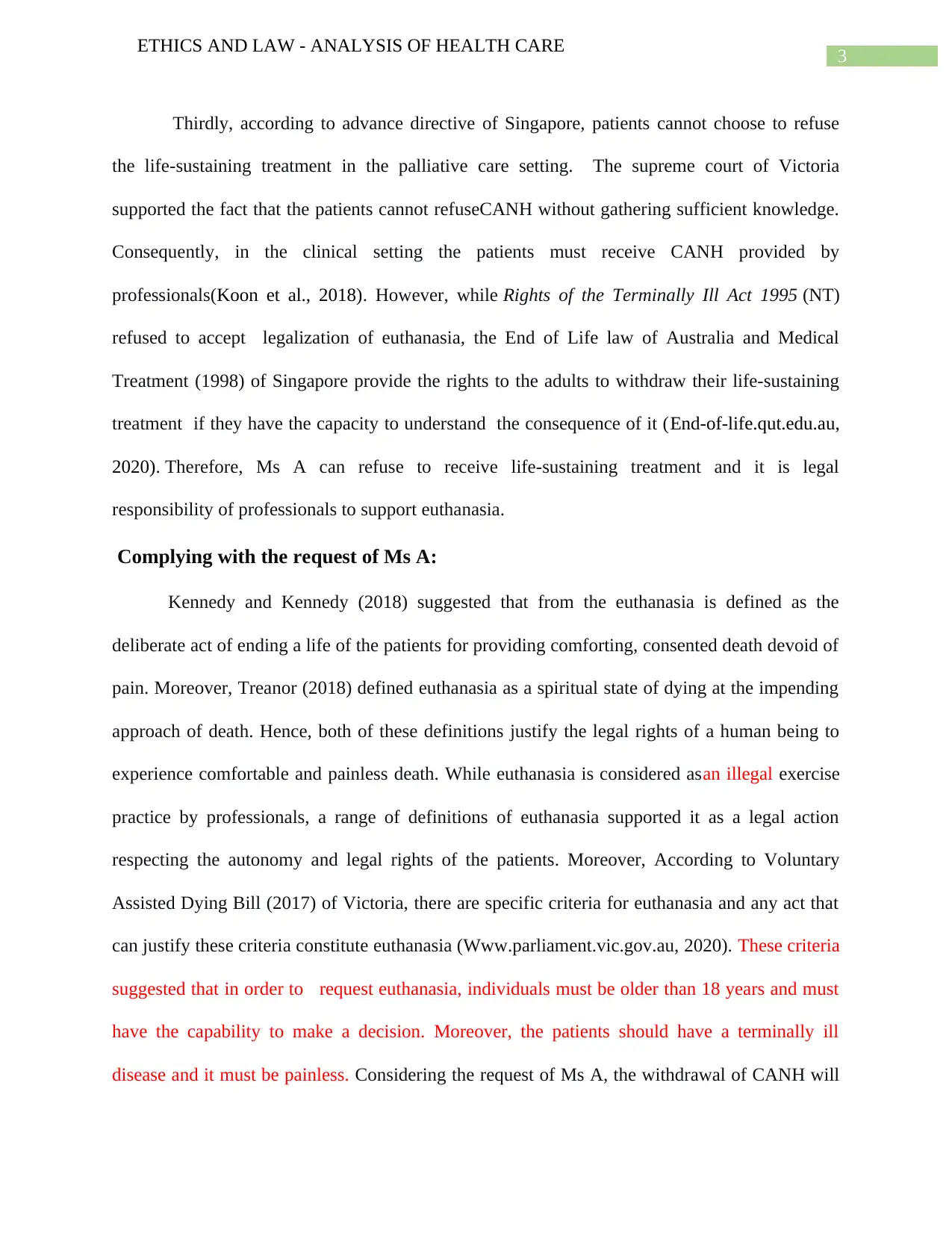
3
ETHICS AND LAW - ANALYSIS OF HEALTH CARE
Thirdly, according to advance directive of Singapore, patients cannot choose to refuse
the life-sustaining treatment in the palliative care setting. The supreme court of Victoria
supported the fact that the patients cannot refuseCANH without gathering sufficient knowledge.
Consequently, in the clinical setting the patients must receive CANH provided by
professionals(Koon et al., 2018). However, while Rights of the Terminally Ill Act 1995 (NT)
refused to accept legalization of euthanasia, the End of Life law of Australia and Medical
Treatment (1998) of Singapore provide the rights to the adults to withdraw their life-sustaining
treatment if they have the capacity to understand the consequence of it (End-of-life.qut.edu.au,
2020). Therefore, Ms A can refuse to receive life-sustaining treatment and it is legal
responsibility of professionals to support euthanasia.
Complying with the request of Ms A:
Kennedy and Kennedy (2018) suggested that from the euthanasia is defined as the
deliberate act of ending a life of the patients for providing comforting, consented death devoid of
pain. Moreover, Treanor (2018) defined euthanasia as a spiritual state of dying at the impending
approach of death. Hence, both of these definitions justify the legal rights of a human being to
experience comfortable and painless death. While euthanasia is considered asan illegal exercise
practice by professionals, a range of definitions of euthanasia supported it as a legal action
respecting the autonomy and legal rights of the patients. Moreover, According to Voluntary
Assisted Dying Bill (2017) of Victoria, there are specific criteria for euthanasia and any act that
can justify these criteria constitute euthanasia (Www.parliament.vic.gov.au, 2020). These criteria
suggested that in order to request euthanasia, individuals must be older than 18 years and must
have the capability to make a decision. Moreover, the patients should have a terminally ill
disease and it must be painless. Considering the request of Ms A, the withdrawal of CANH will
ETHICS AND LAW - ANALYSIS OF HEALTH CARE
Thirdly, according to advance directive of Singapore, patients cannot choose to refuse
the life-sustaining treatment in the palliative care setting. The supreme court of Victoria
supported the fact that the patients cannot refuseCANH without gathering sufficient knowledge.
Consequently, in the clinical setting the patients must receive CANH provided by
professionals(Koon et al., 2018). However, while Rights of the Terminally Ill Act 1995 (NT)
refused to accept legalization of euthanasia, the End of Life law of Australia and Medical
Treatment (1998) of Singapore provide the rights to the adults to withdraw their life-sustaining
treatment if they have the capacity to understand the consequence of it (End-of-life.qut.edu.au,
2020). Therefore, Ms A can refuse to receive life-sustaining treatment and it is legal
responsibility of professionals to support euthanasia.
Complying with the request of Ms A:
Kennedy and Kennedy (2018) suggested that from the euthanasia is defined as the
deliberate act of ending a life of the patients for providing comforting, consented death devoid of
pain. Moreover, Treanor (2018) defined euthanasia as a spiritual state of dying at the impending
approach of death. Hence, both of these definitions justify the legal rights of a human being to
experience comfortable and painless death. While euthanasia is considered asan illegal exercise
practice by professionals, a range of definitions of euthanasia supported it as a legal action
respecting the autonomy and legal rights of the patients. Moreover, According to Voluntary
Assisted Dying Bill (2017) of Victoria, there are specific criteria for euthanasia and any act that
can justify these criteria constitute euthanasia (Www.parliament.vic.gov.au, 2020). These criteria
suggested that in order to request euthanasia, individuals must be older than 18 years and must
have the capability to make a decision. Moreover, the patients should have a terminally ill
disease and it must be painless. Considering the request of Ms A, the withdrawal of CANH will
Paraphrase This Document
Need a fresh take? Get an instant paraphrase of this document with our AI Paraphraser
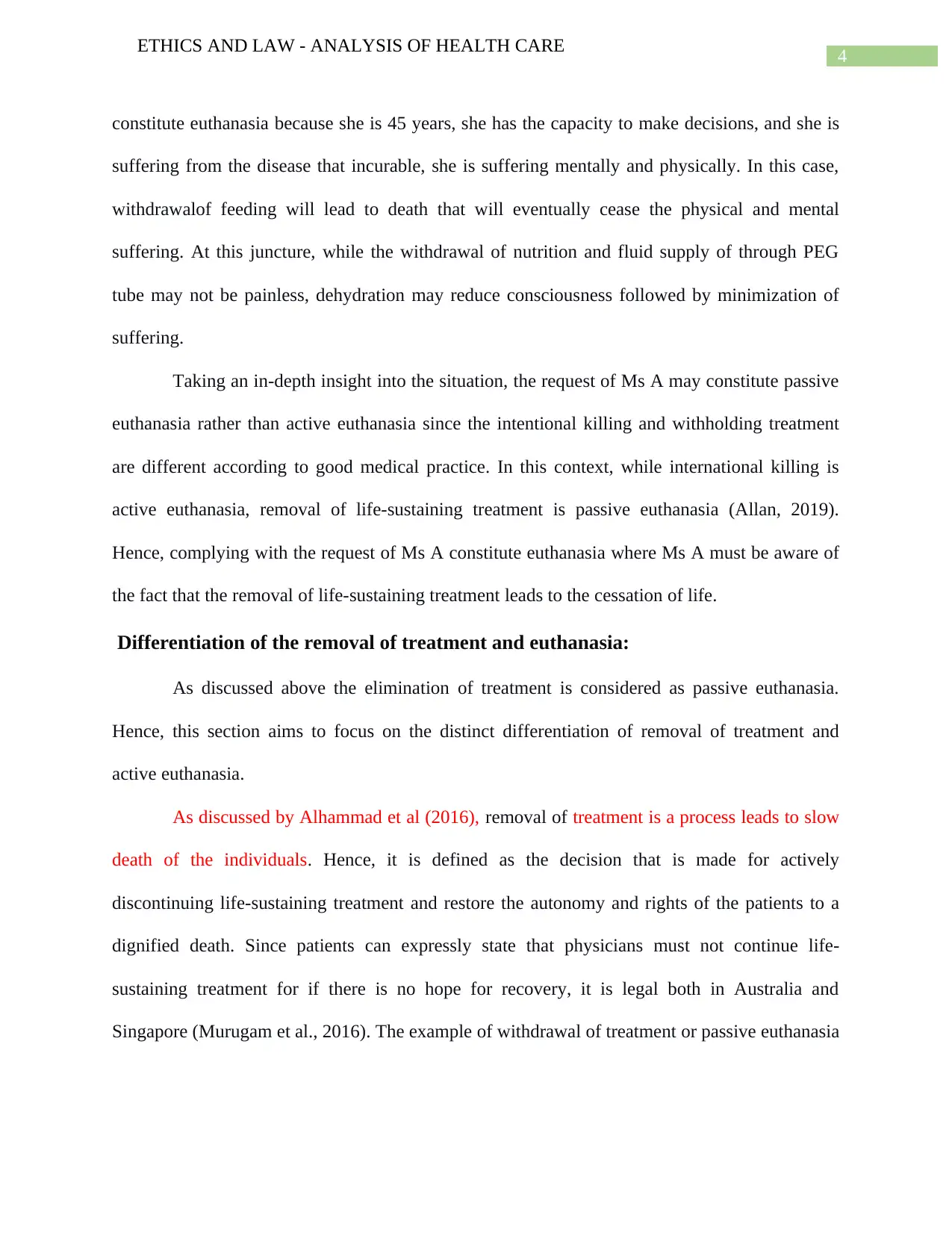
4
ETHICS AND LAW - ANALYSIS OF HEALTH CARE
constitute euthanasia because she is 45 years, she has the capacity to make decisions, and she is
suffering from the disease that incurable, she is suffering mentally and physically. In this case,
withdrawalof feeding will lead to death that will eventually cease the physical and mental
suffering. At this juncture, while the withdrawal of nutrition and fluid supply of through PEG
tube may not be painless, dehydration may reduce consciousness followed by minimization of
suffering.
Taking an in-depth insight into the situation, the request of Ms A may constitute passive
euthanasia rather than active euthanasia since the intentional killing and withholding treatment
are different according to good medical practice. In this context, while international killing is
active euthanasia, removal of life-sustaining treatment is passive euthanasia (Allan, 2019).
Hence, complying with the request of Ms A constitute euthanasia where Ms A must be aware of
the fact that the removal of life-sustaining treatment leads to the cessation of life.
Differentiation of the removal of treatment and euthanasia:
As discussed above the elimination of treatment is considered as passive euthanasia.
Hence, this section aims to focus on the distinct differentiation of removal of treatment and
active euthanasia.
As discussed by Alhammad et al (2016), removal of treatment is a process leads to slow
death of the individuals. Hence, it is defined as the decision that is made for actively
discontinuing life-sustaining treatment and restore the autonomy and rights of the patients to a
dignified death. Since patients can expressly state that physicians must not continue life-
sustaining treatment for if there is no hope for recovery, it is legal both in Australia and
Singapore (Murugam et al., 2016). The example of withdrawal of treatment or passive euthanasia
ETHICS AND LAW - ANALYSIS OF HEALTH CARE
constitute euthanasia because she is 45 years, she has the capacity to make decisions, and she is
suffering from the disease that incurable, she is suffering mentally and physically. In this case,
withdrawalof feeding will lead to death that will eventually cease the physical and mental
suffering. At this juncture, while the withdrawal of nutrition and fluid supply of through PEG
tube may not be painless, dehydration may reduce consciousness followed by minimization of
suffering.
Taking an in-depth insight into the situation, the request of Ms A may constitute passive
euthanasia rather than active euthanasia since the intentional killing and withholding treatment
are different according to good medical practice. In this context, while international killing is
active euthanasia, removal of life-sustaining treatment is passive euthanasia (Allan, 2019).
Hence, complying with the request of Ms A constitute euthanasia where Ms A must be aware of
the fact that the removal of life-sustaining treatment leads to the cessation of life.
Differentiation of the removal of treatment and euthanasia:
As discussed above the elimination of treatment is considered as passive euthanasia.
Hence, this section aims to focus on the distinct differentiation of removal of treatment and
active euthanasia.
As discussed by Alhammad et al (2016), removal of treatment is a process leads to slow
death of the individuals. Hence, it is defined as the decision that is made for actively
discontinuing life-sustaining treatment and restore the autonomy and rights of the patients to a
dignified death. Since patients can expressly state that physicians must not continue life-
sustaining treatment for if there is no hope for recovery, it is legal both in Australia and
Singapore (Murugam et al., 2016). The example of withdrawal of treatment or passive euthanasia
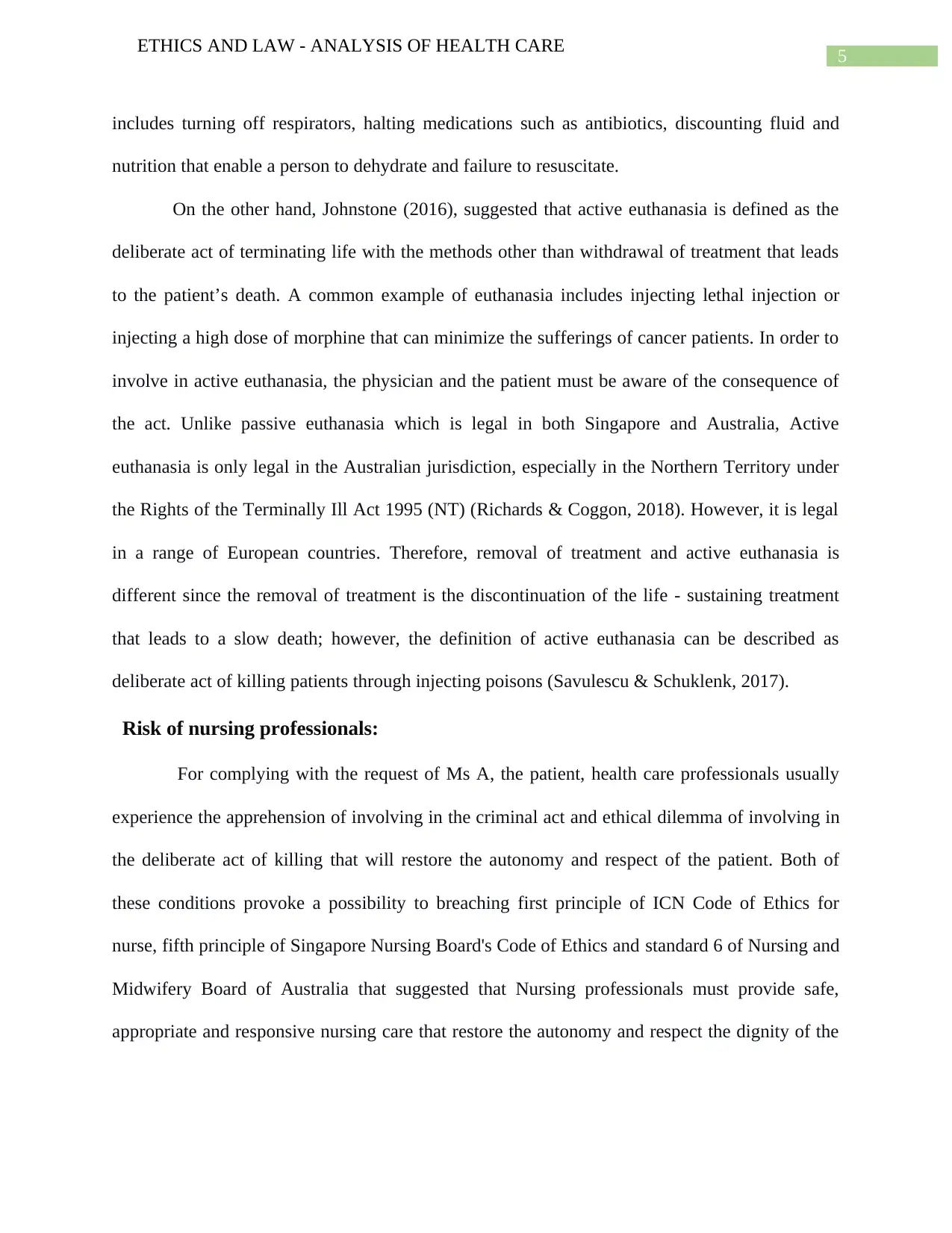
5
ETHICS AND LAW - ANALYSIS OF HEALTH CARE
includes turning off respirators, halting medications such as antibiotics, discounting fluid and
nutrition that enable a person to dehydrate and failure to resuscitate.
On the other hand, Johnstone (2016), suggested that active euthanasia is defined as the
deliberate act of terminating life with the methods other than withdrawal of treatment that leads
to the patient’s death. A common example of euthanasia includes injecting lethal injection or
injecting a high dose of morphine that can minimize the sufferings of cancer patients. In order to
involve in active euthanasia, the physician and the patient must be aware of the consequence of
the act. Unlike passive euthanasia which is legal in both Singapore and Australia, Active
euthanasia is only legal in the Australian jurisdiction, especially in the Northern Territory under
the Rights of the Terminally Ill Act 1995 (NT) (Richards & Coggon, 2018). However, it is legal
in a range of European countries. Therefore, removal of treatment and active euthanasia is
different since the removal of treatment is the discontinuation of the life - sustaining treatment
that leads to a slow death; however, the definition of active euthanasia can be described as
deliberate act of killing patients through injecting poisons (Savulescu & Schuklenk, 2017).
Risk of nursing professionals:
For complying with the request of Ms A, the patient, health care professionals usually
experience the apprehension of involving in the criminal act and ethical dilemma of involving in
the deliberate act of killing that will restore the autonomy and respect of the patient. Both of
these conditions provoke a possibility to breaching first principle of ICN Code of Ethics for
nurse, fifth principle of Singapore Nursing Board's Code of Ethics and standard 6 of Nursing and
Midwifery Board of Australia that suggested that Nursing professionals must provide safe,
appropriate and responsive nursing care that restore the autonomy and respect the dignity of the
ETHICS AND LAW - ANALYSIS OF HEALTH CARE
includes turning off respirators, halting medications such as antibiotics, discounting fluid and
nutrition that enable a person to dehydrate and failure to resuscitate.
On the other hand, Johnstone (2016), suggested that active euthanasia is defined as the
deliberate act of terminating life with the methods other than withdrawal of treatment that leads
to the patient’s death. A common example of euthanasia includes injecting lethal injection or
injecting a high dose of morphine that can minimize the sufferings of cancer patients. In order to
involve in active euthanasia, the physician and the patient must be aware of the consequence of
the act. Unlike passive euthanasia which is legal in both Singapore and Australia, Active
euthanasia is only legal in the Australian jurisdiction, especially in the Northern Territory under
the Rights of the Terminally Ill Act 1995 (NT) (Richards & Coggon, 2018). However, it is legal
in a range of European countries. Therefore, removal of treatment and active euthanasia is
different since the removal of treatment is the discontinuation of the life - sustaining treatment
that leads to a slow death; however, the definition of active euthanasia can be described as
deliberate act of killing patients through injecting poisons (Savulescu & Schuklenk, 2017).
Risk of nursing professionals:
For complying with the request of Ms A, the patient, health care professionals usually
experience the apprehension of involving in the criminal act and ethical dilemma of involving in
the deliberate act of killing that will restore the autonomy and respect of the patient. Both of
these conditions provoke a possibility to breaching first principle of ICN Code of Ethics for
nurse, fifth principle of Singapore Nursing Board's Code of Ethics and standard 6 of Nursing and
Midwifery Board of Australia that suggested that Nursing professionals must provide safe,
appropriate and responsive nursing care that restore the autonomy and respect the dignity of the
⊘ This is a preview!⊘
Do you want full access?
Subscribe today to unlock all pages.

Trusted by 1+ million students worldwide
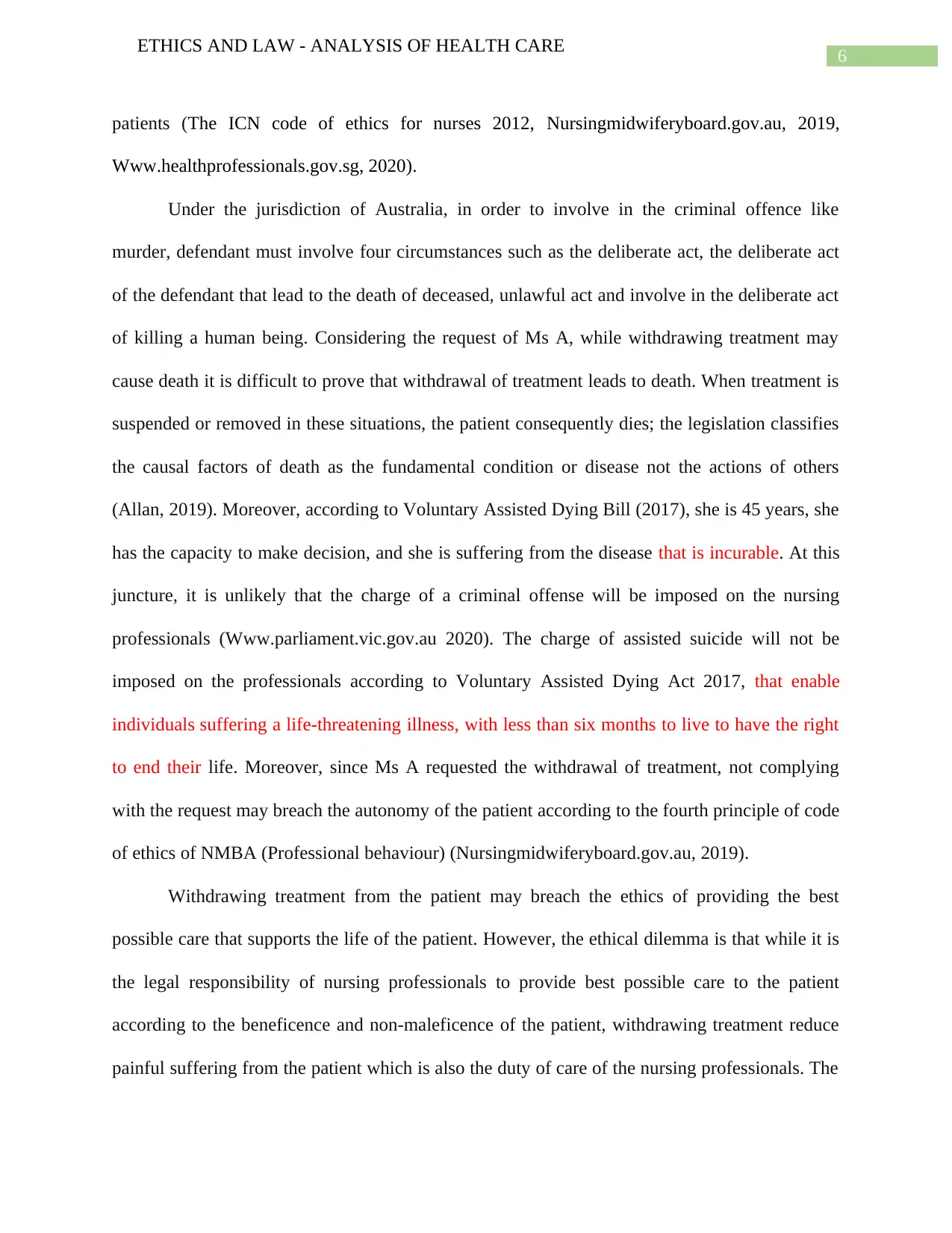
6
ETHICS AND LAW - ANALYSIS OF HEALTH CARE
patients (The ICN code of ethics for nurses 2012, Nursingmidwiferyboard.gov.au, 2019,
Www.healthprofessionals.gov.sg, 2020).
Under the jurisdiction of Australia, in order to involve in the criminal offence like
murder, defendant must involve four circumstances such as the deliberate act, the deliberate act
of the defendant that lead to the death of deceased, unlawful act and involve in the deliberate act
of killing a human being. Considering the request of Ms A, while withdrawing treatment may
cause death it is difficult to prove that withdrawal of treatment leads to death. When treatment is
suspended or removed in these situations, the patient consequently dies; the legislation classifies
the causal factors of death as the fundamental condition or disease not the actions of others
(Allan, 2019). Moreover, according to Voluntary Assisted Dying Bill (2017), she is 45 years, she
has the capacity to make decision, and she is suffering from the disease that is incurable. At this
juncture, it is unlikely that the charge of a criminal offense will be imposed on the nursing
professionals (Www.parliament.vic.gov.au 2020). The charge of assisted suicide will not be
imposed on the professionals according to Voluntary Assisted Dying Act 2017, that enable
individuals suffering a life-threatening illness, with less than six months to live to have the right
to end their life. Moreover, since Ms A requested the withdrawal of treatment, not complying
with the request may breach the autonomy of the patient according to the fourth principle of code
of ethics of NMBA (Professional behaviour) (Nursingmidwiferyboard.gov.au, 2019).
Withdrawing treatment from the patient may breach the ethics of providing the best
possible care that supports the life of the patient. However, the ethical dilemma is that while it is
the legal responsibility of nursing professionals to provide best possible care to the patient
according to the beneficence and non-maleficence of the patient, withdrawing treatment reduce
painful suffering from the patient which is also the duty of care of the nursing professionals. The
ETHICS AND LAW - ANALYSIS OF HEALTH CARE
patients (The ICN code of ethics for nurses 2012, Nursingmidwiferyboard.gov.au, 2019,
Www.healthprofessionals.gov.sg, 2020).
Under the jurisdiction of Australia, in order to involve in the criminal offence like
murder, defendant must involve four circumstances such as the deliberate act, the deliberate act
of the defendant that lead to the death of deceased, unlawful act and involve in the deliberate act
of killing a human being. Considering the request of Ms A, while withdrawing treatment may
cause death it is difficult to prove that withdrawal of treatment leads to death. When treatment is
suspended or removed in these situations, the patient consequently dies; the legislation classifies
the causal factors of death as the fundamental condition or disease not the actions of others
(Allan, 2019). Moreover, according to Voluntary Assisted Dying Bill (2017), she is 45 years, she
has the capacity to make decision, and she is suffering from the disease that is incurable. At this
juncture, it is unlikely that the charge of a criminal offense will be imposed on the nursing
professionals (Www.parliament.vic.gov.au 2020). The charge of assisted suicide will not be
imposed on the professionals according to Voluntary Assisted Dying Act 2017, that enable
individuals suffering a life-threatening illness, with less than six months to live to have the right
to end their life. Moreover, since Ms A requested the withdrawal of treatment, not complying
with the request may breach the autonomy of the patient according to the fourth principle of code
of ethics of NMBA (Professional behaviour) (Nursingmidwiferyboard.gov.au, 2019).
Withdrawing treatment from the patient may breach the ethics of providing the best
possible care that supports the life of the patient. However, the ethical dilemma is that while it is
the legal responsibility of nursing professionals to provide best possible care to the patient
according to the beneficence and non-maleficence of the patient, withdrawing treatment reduce
painful suffering from the patient which is also the duty of care of the nursing professionals. The
Paraphrase This Document
Need a fresh take? Get an instant paraphrase of this document with our AI Paraphraser
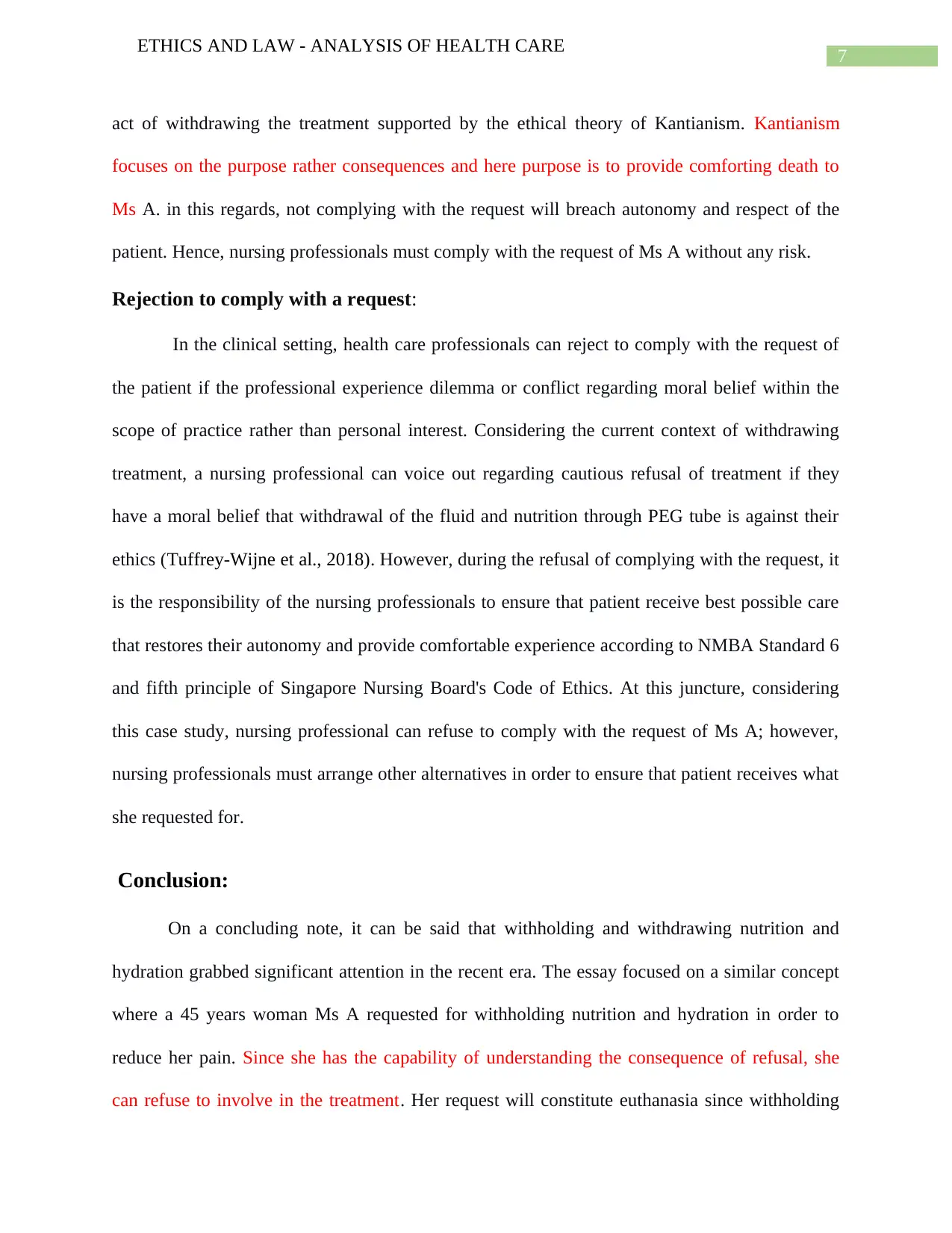
7
ETHICS AND LAW - ANALYSIS OF HEALTH CARE
act of withdrawing the treatment supported by the ethical theory of Kantianism. Kantianism
focuses on the purpose rather consequences and here purpose is to provide comforting death to
Ms A. in this regards, not complying with the request will breach autonomy and respect of the
patient. Hence, nursing professionals must comply with the request of Ms A without any risk.
Rejection to comply with a request:
In the clinical setting, health care professionals can reject to comply with the request of
the patient if the professional experience dilemma or conflict regarding moral belief within the
scope of practice rather than personal interest. Considering the current context of withdrawing
treatment, a nursing professional can voice out regarding cautious refusal of treatment if they
have a moral belief that withdrawal of the fluid and nutrition through PEG tube is against their
ethics (Tuffrey-Wijne et al., 2018). However, during the refusal of complying with the request, it
is the responsibility of the nursing professionals to ensure that patient receive best possible care
that restores their autonomy and provide comfortable experience according to NMBA Standard 6
and fifth principle of Singapore Nursing Board's Code of Ethics. At this juncture, considering
this case study, nursing professional can refuse to comply with the request of Ms A; however,
nursing professionals must arrange other alternatives in order to ensure that patient receives what
she requested for.
Conclusion:
On a concluding note, it can be said that withholding and withdrawing nutrition and
hydration grabbed significant attention in the recent era. The essay focused on a similar concept
where a 45 years woman Ms A requested for withholding nutrition and hydration in order to
reduce her pain. Since she has the capability of understanding the consequence of refusal, she
can refuse to involve in the treatment. Her request will constitute euthanasia since withholding
ETHICS AND LAW - ANALYSIS OF HEALTH CARE
act of withdrawing the treatment supported by the ethical theory of Kantianism. Kantianism
focuses on the purpose rather consequences and here purpose is to provide comforting death to
Ms A. in this regards, not complying with the request will breach autonomy and respect of the
patient. Hence, nursing professionals must comply with the request of Ms A without any risk.
Rejection to comply with a request:
In the clinical setting, health care professionals can reject to comply with the request of
the patient if the professional experience dilemma or conflict regarding moral belief within the
scope of practice rather than personal interest. Considering the current context of withdrawing
treatment, a nursing professional can voice out regarding cautious refusal of treatment if they
have a moral belief that withdrawal of the fluid and nutrition through PEG tube is against their
ethics (Tuffrey-Wijne et al., 2018). However, during the refusal of complying with the request, it
is the responsibility of the nursing professionals to ensure that patient receive best possible care
that restores their autonomy and provide comfortable experience according to NMBA Standard 6
and fifth principle of Singapore Nursing Board's Code of Ethics. At this juncture, considering
this case study, nursing professional can refuse to comply with the request of Ms A; however,
nursing professionals must arrange other alternatives in order to ensure that patient receives what
she requested for.
Conclusion:
On a concluding note, it can be said that withholding and withdrawing nutrition and
hydration grabbed significant attention in the recent era. The essay focused on a similar concept
where a 45 years woman Ms A requested for withholding nutrition and hydration in order to
reduce her pain. Since she has the capability of understanding the consequence of refusal, she
can refuse to involve in the treatment. Her request will constitute euthanasia since withholding
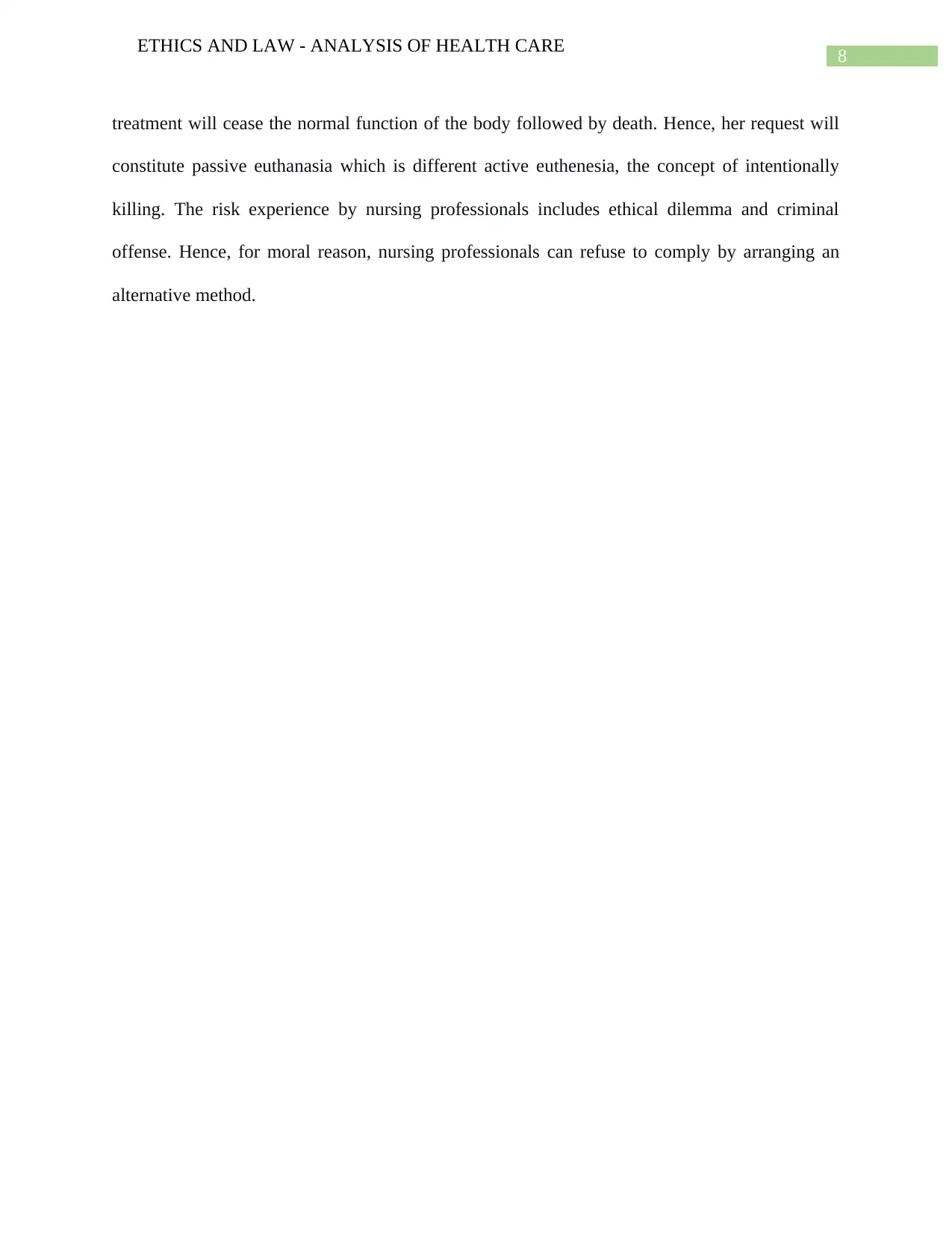
8
ETHICS AND LAW - ANALYSIS OF HEALTH CARE
treatment will cease the normal function of the body followed by death. Hence, her request will
constitute passive euthanasia which is different active euthenesia, the concept of intentionally
killing. The risk experience by nursing professionals includes ethical dilemma and criminal
offense. Hence, for moral reason, nursing professionals can refuse to comply by arranging an
alternative method.
ETHICS AND LAW - ANALYSIS OF HEALTH CARE
treatment will cease the normal function of the body followed by death. Hence, her request will
constitute passive euthanasia which is different active euthenesia, the concept of intentionally
killing. The risk experience by nursing professionals includes ethical dilemma and criminal
offense. Hence, for moral reason, nursing professionals can refuse to comply by arranging an
alternative method.
⊘ This is a preview!⊘
Do you want full access?
Subscribe today to unlock all pages.

Trusted by 1+ million students worldwide
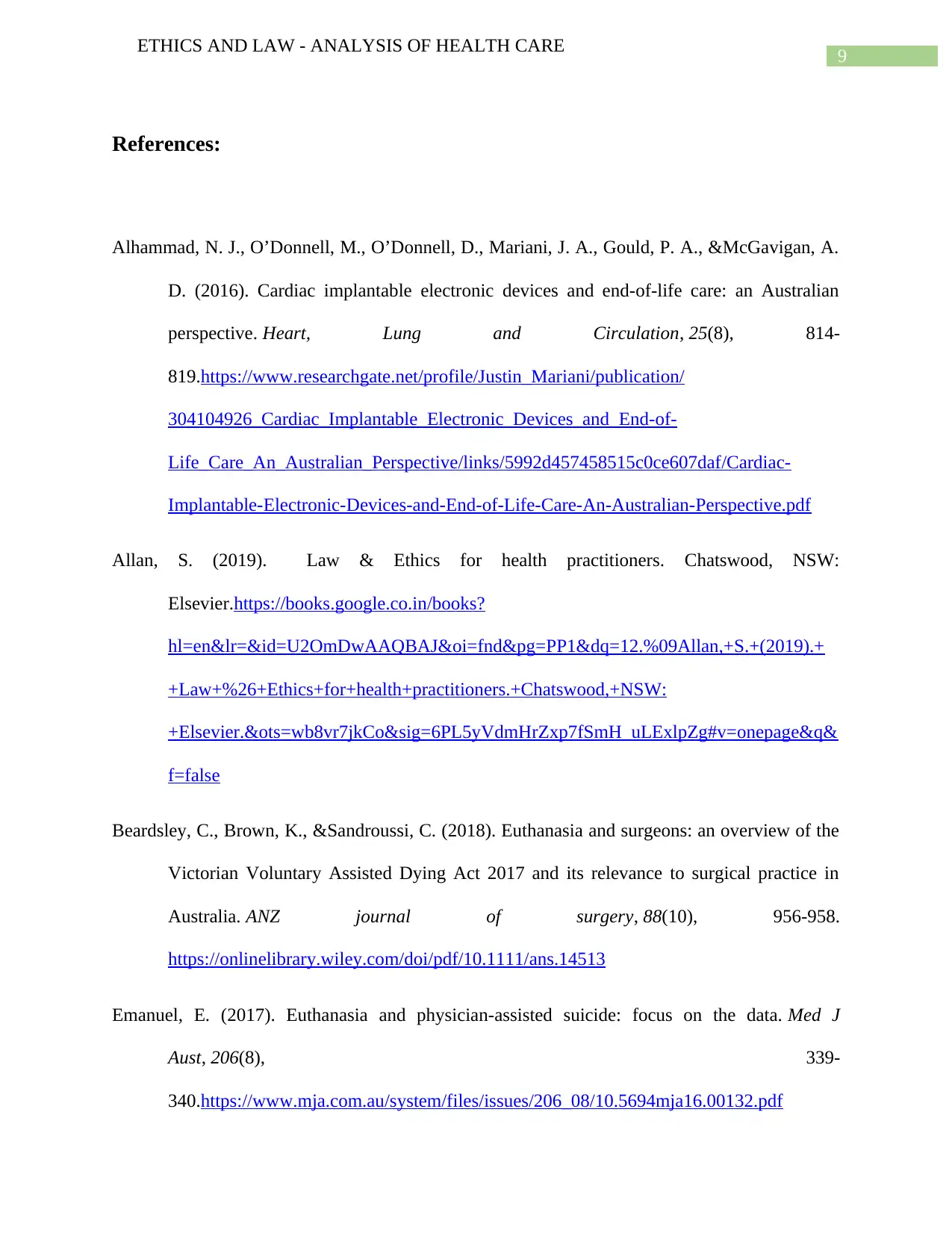
9
ETHICS AND LAW - ANALYSIS OF HEALTH CARE
References:
Alhammad, N. J., O’Donnell, M., O’Donnell, D., Mariani, J. A., Gould, P. A., &McGavigan, A.
D. (2016). Cardiac implantable electronic devices and end-of-life care: an Australian
perspective. Heart, Lung and Circulation, 25(8), 814-
819.https://www.researchgate.net/profile/Justin_Mariani/publication/
304104926_Cardiac_Implantable_Electronic_Devices_and_End-of-
Life_Care_An_Australian_Perspective/links/5992d457458515c0ce607daf/Cardiac-
Implantable-Electronic-Devices-and-End-of-Life-Care-An-Australian-Perspective.pdf
Allan, S. (2019). Law & Ethics for health practitioners. Chatswood, NSW:
Elsevier.https://books.google.co.in/books?
hl=en&lr=&id=U2OmDwAAQBAJ&oi=fnd&pg=PP1&dq=12.%09Allan,+S.+(2019).+
+Law+%26+Ethics+for+health+practitioners.+Chatswood,+NSW:
+Elsevier.&ots=wb8vr7jkCo&sig=6PL5yVdmHrZxp7fSmH_uLExlpZg#v=onepage&q&
f=false
Beardsley, C., Brown, K., &Sandroussi, C. (2018). Euthanasia and surgeons: an overview of the
Victorian Voluntary Assisted Dying Act 2017 and its relevance to surgical practice in
Australia. ANZ journal of surgery, 88(10), 956-958.
https://onlinelibrary.wiley.com/doi/pdf/10.1111/ans.14513
Emanuel, E. (2017). Euthanasia and physician-assisted suicide: focus on the data. Med J
Aust, 206(8), 339-
340.https://www.mja.com.au/system/files/issues/206_08/10.5694mja16.00132.pdf
ETHICS AND LAW - ANALYSIS OF HEALTH CARE
References:
Alhammad, N. J., O’Donnell, M., O’Donnell, D., Mariani, J. A., Gould, P. A., &McGavigan, A.
D. (2016). Cardiac implantable electronic devices and end-of-life care: an Australian
perspective. Heart, Lung and Circulation, 25(8), 814-
819.https://www.researchgate.net/profile/Justin_Mariani/publication/
304104926_Cardiac_Implantable_Electronic_Devices_and_End-of-
Life_Care_An_Australian_Perspective/links/5992d457458515c0ce607daf/Cardiac-
Implantable-Electronic-Devices-and-End-of-Life-Care-An-Australian-Perspective.pdf
Allan, S. (2019). Law & Ethics for health practitioners. Chatswood, NSW:
Elsevier.https://books.google.co.in/books?
hl=en&lr=&id=U2OmDwAAQBAJ&oi=fnd&pg=PP1&dq=12.%09Allan,+S.+(2019).+
+Law+%26+Ethics+for+health+practitioners.+Chatswood,+NSW:
+Elsevier.&ots=wb8vr7jkCo&sig=6PL5yVdmHrZxp7fSmH_uLExlpZg#v=onepage&q&
f=false
Beardsley, C., Brown, K., &Sandroussi, C. (2018). Euthanasia and surgeons: an overview of the
Victorian Voluntary Assisted Dying Act 2017 and its relevance to surgical practice in
Australia. ANZ journal of surgery, 88(10), 956-958.
https://onlinelibrary.wiley.com/doi/pdf/10.1111/ans.14513
Emanuel, E. (2017). Euthanasia and physician-assisted suicide: focus on the data. Med J
Aust, 206(8), 339-
340.https://www.mja.com.au/system/files/issues/206_08/10.5694mja16.00132.pdf
Paraphrase This Document
Need a fresh take? Get an instant paraphrase of this document with our AI Paraphraser
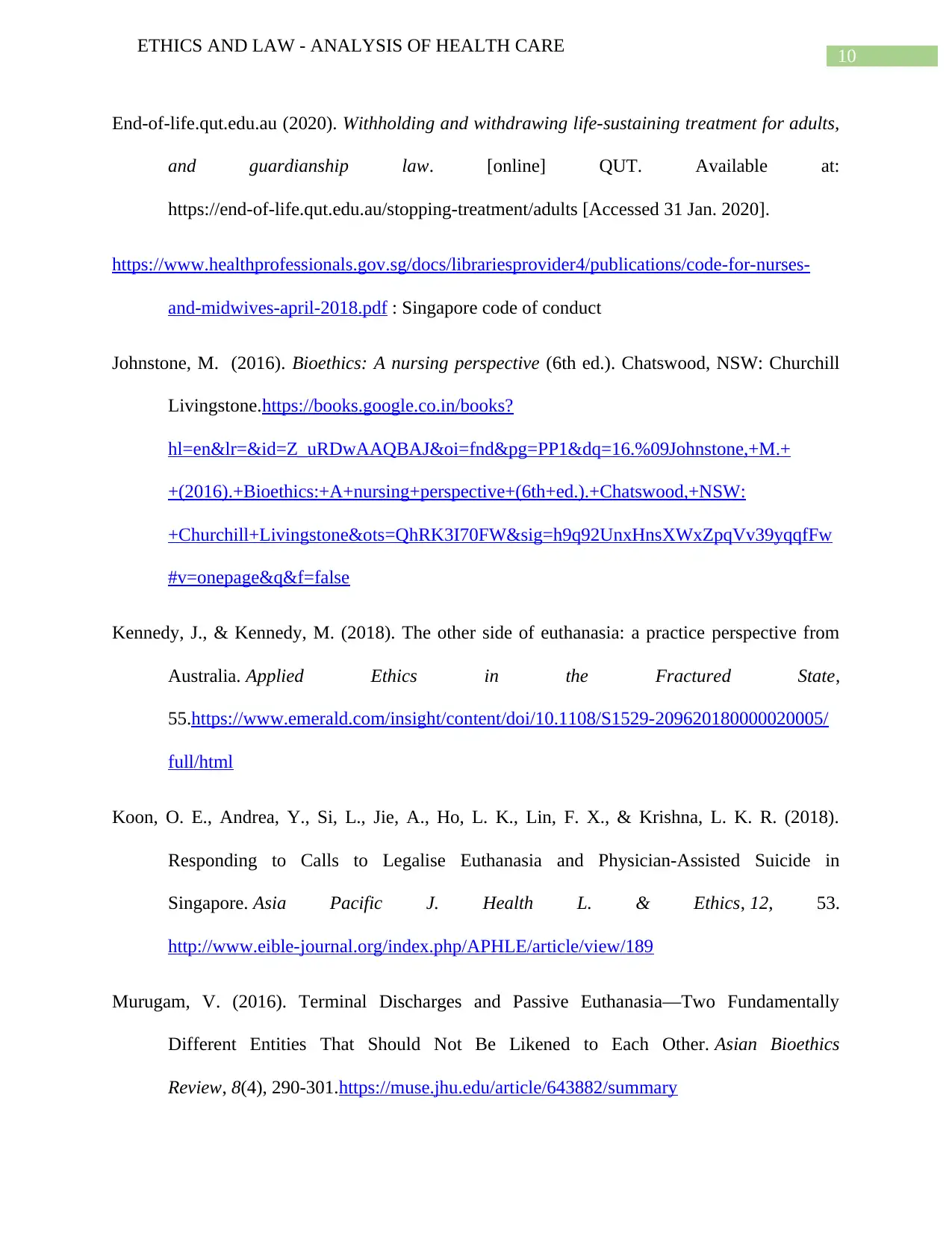
10
ETHICS AND LAW - ANALYSIS OF HEALTH CARE
End-of-life.qut.edu.au (2020). Withholding and withdrawing life-sustaining treatment for adults,
and guardianship law. [online] QUT. Available at:
https://end-of-life.qut.edu.au/stopping-treatment/adults [Accessed 31 Jan. 2020].
https://www.healthprofessionals.gov.sg/docs/librariesprovider4/publications/code-for-nurses-
and-midwives-april-2018.pdf : Singapore code of conduct
Johnstone, M. (2016). Bioethics: A nursing perspective (6th ed.). Chatswood, NSW: Churchill
Livingstone.https://books.google.co.in/books?
hl=en&lr=&id=Z_uRDwAAQBAJ&oi=fnd&pg=PP1&dq=16.%09Johnstone,+M.+
+(2016).+Bioethics:+A+nursing+perspective+(6th+ed.).+Chatswood,+NSW:
+Churchill+Livingstone&ots=QhRK3I70FW&sig=h9q92UnxHnsXWxZpqVv39yqqfFw
#v=onepage&q&f=false
Kennedy, J., & Kennedy, M. (2018). The other side of euthanasia: a practice perspective from
Australia. Applied Ethics in the Fractured State,
55.https://www.emerald.com/insight/content/doi/10.1108/S1529-209620180000020005/
full/html
Koon, O. E., Andrea, Y., Si, L., Jie, A., Ho, L. K., Lin, F. X., & Krishna, L. K. R. (2018).
Responding to Calls to Legalise Euthanasia and Physician-Assisted Suicide in
Singapore. Asia Pacific J. Health L. & Ethics, 12, 53.
http://www.eible-journal.org/index.php/APHLE/article/view/189
Murugam, V. (2016). Terminal Discharges and Passive Euthanasia—Two Fundamentally
Different Entities That Should Not Be Likened to Each Other. Asian Bioethics
Review, 8(4), 290-301.https://muse.jhu.edu/article/643882/summary
ETHICS AND LAW - ANALYSIS OF HEALTH CARE
End-of-life.qut.edu.au (2020). Withholding and withdrawing life-sustaining treatment for adults,
and guardianship law. [online] QUT. Available at:
https://end-of-life.qut.edu.au/stopping-treatment/adults [Accessed 31 Jan. 2020].
https://www.healthprofessionals.gov.sg/docs/librariesprovider4/publications/code-for-nurses-
and-midwives-april-2018.pdf : Singapore code of conduct
Johnstone, M. (2016). Bioethics: A nursing perspective (6th ed.). Chatswood, NSW: Churchill
Livingstone.https://books.google.co.in/books?
hl=en&lr=&id=Z_uRDwAAQBAJ&oi=fnd&pg=PP1&dq=16.%09Johnstone,+M.+
+(2016).+Bioethics:+A+nursing+perspective+(6th+ed.).+Chatswood,+NSW:
+Churchill+Livingstone&ots=QhRK3I70FW&sig=h9q92UnxHnsXWxZpqVv39yqqfFw
#v=onepage&q&f=false
Kennedy, J., & Kennedy, M. (2018). The other side of euthanasia: a practice perspective from
Australia. Applied Ethics in the Fractured State,
55.https://www.emerald.com/insight/content/doi/10.1108/S1529-209620180000020005/
full/html
Koon, O. E., Andrea, Y., Si, L., Jie, A., Ho, L. K., Lin, F. X., & Krishna, L. K. R. (2018).
Responding to Calls to Legalise Euthanasia and Physician-Assisted Suicide in
Singapore. Asia Pacific J. Health L. & Ethics, 12, 53.
http://www.eible-journal.org/index.php/APHLE/article/view/189
Murugam, V. (2016). Terminal Discharges and Passive Euthanasia—Two Fundamentally
Different Entities That Should Not Be Likened to Each Other. Asian Bioethics
Review, 8(4), 290-301.https://muse.jhu.edu/article/643882/summary
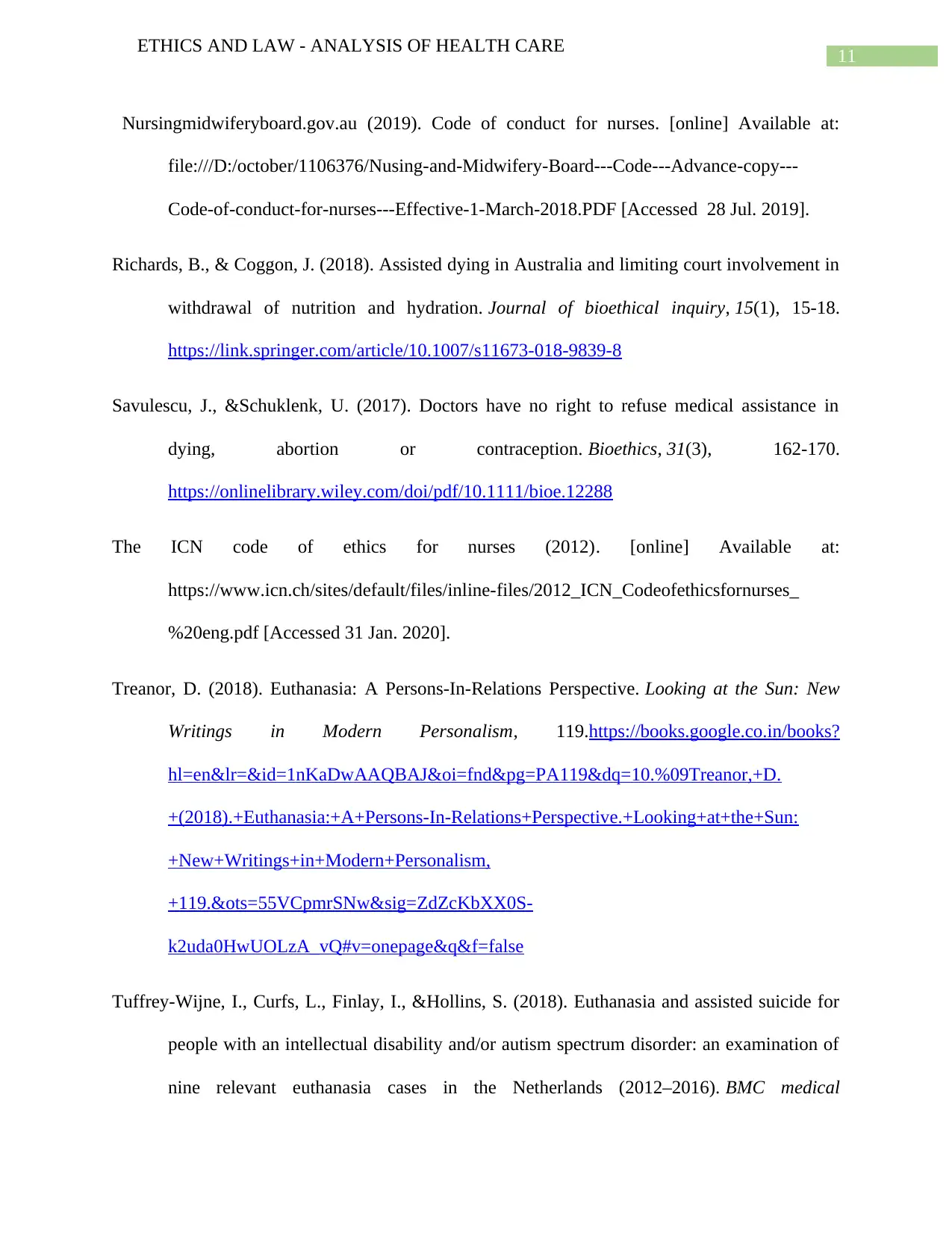
11
ETHICS AND LAW - ANALYSIS OF HEALTH CARE
Nursingmidwiferyboard.gov.au (2019). Code of conduct for nurses. [online] Available at:
file:///D:/october/1106376/Nusing-and-Midwifery-Board---Code---Advance-copy---
Code-of-conduct-for-nurses---Effective-1-March-2018.PDF [Accessed 28 Jul. 2019].
Richards, B., & Coggon, J. (2018). Assisted dying in Australia and limiting court involvement in
withdrawal of nutrition and hydration. Journal of bioethical inquiry, 15(1), 15-18.
https://link.springer.com/article/10.1007/s11673-018-9839-8
Savulescu, J., &Schuklenk, U. (2017). Doctors have no right to refuse medical assistance in
dying, abortion or contraception. Bioethics, 31(3), 162-170.
https://onlinelibrary.wiley.com/doi/pdf/10.1111/bioe.12288
The ICN code of ethics for nurses (2012). [online] Available at:
https://www.icn.ch/sites/default/files/inline-files/2012_ICN_Codeofethicsfornurses_
%20eng.pdf [Accessed 31 Jan. 2020].
Treanor, D. (2018). Euthanasia: A Persons-In-Relations Perspective. Looking at the Sun: New
Writings in Modern Personalism, 119.https://books.google.co.in/books?
hl=en&lr=&id=1nKaDwAAQBAJ&oi=fnd&pg=PA119&dq=10.%09Treanor,+D.
+(2018).+Euthanasia:+A+Persons-In-Relations+Perspective.+Looking+at+the+Sun:
+New+Writings+in+Modern+Personalism,
+119.&ots=55VCpmrSNw&sig=ZdZcKbXX0S-
k2uda0HwUOLzA_vQ#v=onepage&q&f=false
Tuffrey-Wijne, I., Curfs, L., Finlay, I., &Hollins, S. (2018). Euthanasia and assisted suicide for
people with an intellectual disability and/or autism spectrum disorder: an examination of
nine relevant euthanasia cases in the Netherlands (2012–2016). BMC medical
ETHICS AND LAW - ANALYSIS OF HEALTH CARE
Nursingmidwiferyboard.gov.au (2019). Code of conduct for nurses. [online] Available at:
file:///D:/october/1106376/Nusing-and-Midwifery-Board---Code---Advance-copy---
Code-of-conduct-for-nurses---Effective-1-March-2018.PDF [Accessed 28 Jul. 2019].
Richards, B., & Coggon, J. (2018). Assisted dying in Australia and limiting court involvement in
withdrawal of nutrition and hydration. Journal of bioethical inquiry, 15(1), 15-18.
https://link.springer.com/article/10.1007/s11673-018-9839-8
Savulescu, J., &Schuklenk, U. (2017). Doctors have no right to refuse medical assistance in
dying, abortion or contraception. Bioethics, 31(3), 162-170.
https://onlinelibrary.wiley.com/doi/pdf/10.1111/bioe.12288
The ICN code of ethics for nurses (2012). [online] Available at:
https://www.icn.ch/sites/default/files/inline-files/2012_ICN_Codeofethicsfornurses_
%20eng.pdf [Accessed 31 Jan. 2020].
Treanor, D. (2018). Euthanasia: A Persons-In-Relations Perspective. Looking at the Sun: New
Writings in Modern Personalism, 119.https://books.google.co.in/books?
hl=en&lr=&id=1nKaDwAAQBAJ&oi=fnd&pg=PA119&dq=10.%09Treanor,+D.
+(2018).+Euthanasia:+A+Persons-In-Relations+Perspective.+Looking+at+the+Sun:
+New+Writings+in+Modern+Personalism,
+119.&ots=55VCpmrSNw&sig=ZdZcKbXX0S-
k2uda0HwUOLzA_vQ#v=onepage&q&f=false
Tuffrey-Wijne, I., Curfs, L., Finlay, I., &Hollins, S. (2018). Euthanasia and assisted suicide for
people with an intellectual disability and/or autism spectrum disorder: an examination of
nine relevant euthanasia cases in the Netherlands (2012–2016). BMC medical
⊘ This is a preview!⊘
Do you want full access?
Subscribe today to unlock all pages.

Trusted by 1+ million students worldwide
1 out of 13
Related Documents
Your All-in-One AI-Powered Toolkit for Academic Success.
+13062052269
info@desklib.com
Available 24*7 on WhatsApp / Email
![[object Object]](/_next/static/media/star-bottom.7253800d.svg)
Unlock your academic potential
Copyright © 2020–2026 A2Z Services. All Rights Reserved. Developed and managed by ZUCOL.





